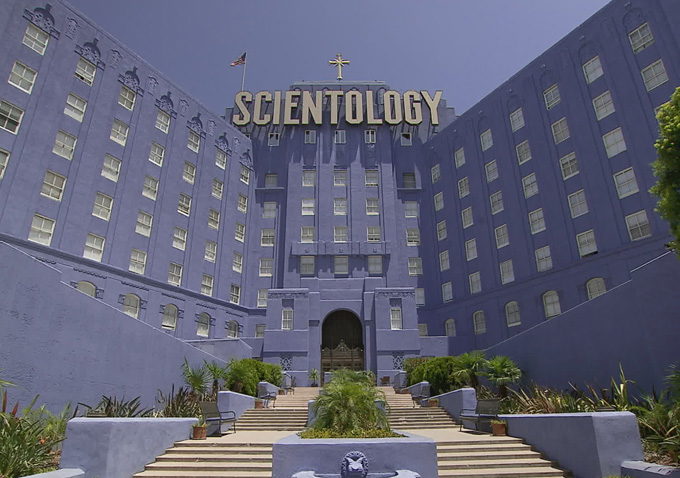 Based on the already-aggrieved reaction of the Church of Scientology to the first few Sundance screenings of Alex Gibney’s new documentary, “Going Clear: Scientology and the Prison of Belief," the high-profile, celebrity-courting church is going to self-immolate when this airs on HBO in a couple of months. And as Gibney’s doc (based on the equally Church-of-Scientology-provoking book by Lawrence Wright) argues, maybe it should. If you’ve read the book, this may be old news, if not, you’re in for a deep dive into the mind of founder L. Ron Hubbard, and into the questionable inner workings of the leadership of Scientology. Observing the absolute madness it was to get into screenings of ‘Going Clear’ at Sundance, audiences are eager for this. From every perspective — humanitarian, economic, and psychological — Gibney’s film lays bare the corruption of power that defines both the genesis of and the current state of the church.
Based on the already-aggrieved reaction of the Church of Scientology to the first few Sundance screenings of Alex Gibney’s new documentary, “Going Clear: Scientology and the Prison of Belief," the high-profile, celebrity-courting church is going to self-immolate when this airs on HBO in a couple of months. And as Gibney’s doc (based on the equally Church-of-Scientology-provoking book by Lawrence Wright) argues, maybe it should. If you’ve read the book, this may be old news, if not, you’re in for a deep dive into the mind of founder L. Ron Hubbard, and into the questionable inner workings of the leadership of Scientology. Observing the absolute madness it was to get into screenings of ‘Going Clear’ at Sundance, audiences are eager for this. From every perspective — humanitarian, economic, and psychological — Gibney’s film lays bare the corruption of power that defines both the genesis of and the current state of the church.
Like many Gibney films, ‘Going Clear’ is primarily based on talking heads interviews. But where a past film like "Client 9" felt a bit more like a conspiracy theory, the proof in ‘Going Clear’ feels absolutely irrefutable as many of the interviews are with formerly high-ranking lieutenants from deep within the inner circle of Scientology leadership. Former Scientologist and filmmaker Paul Haggis also features prominently, as well other long-time former members.
But first, the origin story: through photos, film clips and personal recollections, Gibney creates a portrait of “Dianetics” author and church founder L. Ron Hubbard, a deeply complicated man, a science-fiction writer, a bad husband, and a hapless war vet who exaggerated his achievements. Scientology as self-help doctrine is clearly a way for him to attempt to grapple with his own issues; a way of rationalizing certain rituals and beliefs as something legitimate and based in truth. As he started gaining followers though, Hubbard became obsessed with his own power and control over them.
Power, the amassing and abuse of, is the central thread of the film’s exploration of the organization, from the tactics used to keep celebrity members like Tom Cruise and John Travolta compliant, to internal punishment and abuse described by former members, to an all-out war waged against the IRS, which Scientology actually won. Much of these events are guided by the hands of Hubbard successor David Miscavige, a walking Napoleon complex armed with a billion dollars, a gold braid-bedecked power suit and a vocabulary of made up nonsense words.
Some of the most fascinating footage is from Miscavige’s speeches at Scientology events, which are an ostentatious mix of "The Triumph of the Will" and Cirque du Soleil. From these events, it’s clear that if there’s one thing Miscavige loves, it’s flag twirlers. And pyro. And Tom Cruise. Many have seen the videos of Cruise from his 2004 Medal of Valor ceremony, and they remain just as creepily unhinged as you remember. Furthermore, the doc makes some interesting allegations about Cruise’s marriage to Nicole Kidman, who was labeled a "suppressive person" by the church because she maintained a relationship with her father, a psychologist (Scientology resolutely believes psychiatry to be an evil practice). Damning claims are made that Miscavige hired private investigators to tap Kidman’s phone (oddly enough, at Cruise’s request), and surveilled all of the notes from Cruise’s extensive auditing sessions, using this information to turn him and their adopted children against Kidman.
But, this is not a film about making fun of a cult. ‘Going Clear’ takes Scientology seriously as a tax-exempt organization with billion-dollar coffers and properties around the globe built on the backs of underpaid labor. Like any other corrupt capitalist organization, it’s about the money. Evading taxes and exploiting cheap labor are the name of that game, but Scientology dresses up its money grubbing with a bunch of vague self-help mumbo jumbo and over-the-top pomp and circumstance. There are shocking testimonies of abuse and secret detention centers and horrible accounts of stalking and harassment, but what’s really scary about Scientology is just how much economic might they wield, and as evidenced by their tangle with the IRS, how above the law they feel they are.
Ultimately, Gibney’s film is fascinating for the people in it. The filmmaking is nothing exceptional, but what is remarkable is the bravery shown by those who speak out in the film. The interviewees all seem to share a look of mild shock on their faces, like they’ve just walked into the light and their eyes are still adjusting. As they describe their experiences, they seem anguished, embarrassed and sheepish that they were taken in so deeply by this organization. There is a sense of latent awakening that Gibney manages to capture, and that is the most compelling thing about ‘Going Clear.’ That dawning realization will be spreading soon enough, and that’s clearly what terrifies the leadership of Scientology the most. [B+]
Browse through all our coverage of the 2015 Sundance Film Festival by clicking here.

